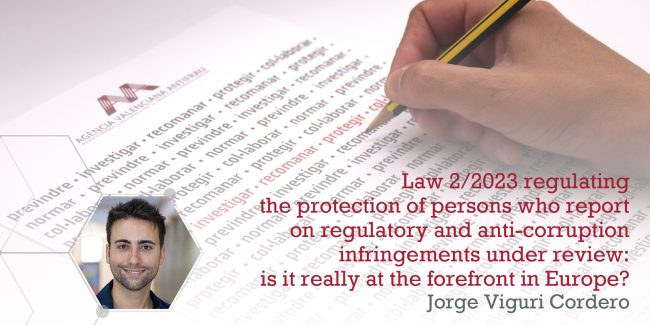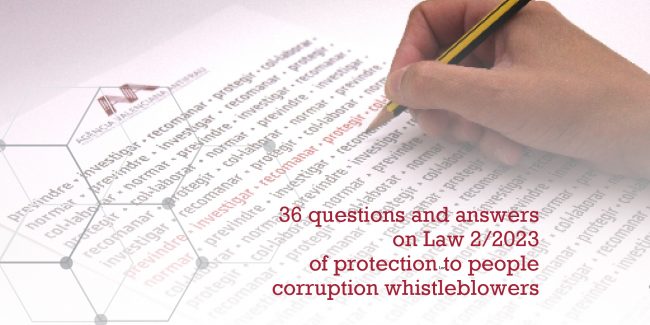Artificial Intelligence and the fight against corruption
In the digital age, the fight against corruption has found a powerful ally in artificial intelligence (AI). This technology, with its ability to analyze large volumes of data and detect hidden patterns, offers unprecedented tools to identify and prevent fraudulent acts. However, its practical implementation is still very limited and not without its challenges. In this article, we explore how AI can transform the fight against corruption and reflect on the governance, organizational, human, and ethical dilemmas that this technological revolution entails. In what areas or areas of the fight against corruption could we apply artificial intelligence? Here are some of the applications that artificial intelligence could have: Public procurement: Control of public tenders by monitoring tenders to detect anomalous patterns, such as tailor-made tenders or tenders always won by the same company. Review of public contracts for unusual clauses or potentially corrupt conditions. Public Audits: Budget audits to analyse expenditures by municipalities and other public administrations, identifying irregular allocations or unjustified expenditures. Control of subsidies and public aid to detect duplication or beneficiaries that do not correspond. Pattern Detection: Detection of anomalous patterns through machine learning, as large volumes of data can be analyzed for anomalous patterns that could indicate fraudulent activity. For example, in financial transactions, tenders, contracts or grants. Text analysis when reviewing documents and emails for suspicious terms or patterns, such as in the case of false reports. Human resources: Human resources management to detect irregularities in selection processes, internal promotions, swaps, etc. Control of conflicts of interest by identifying possible relationships between public administration staff and private companies. Utilities: Detection of irregularities in the management of public services by identifying possible cost overruns, deficiencies or bad practices. Validation of official documents, verifying the authenticity and consistency of documents submitted in administrative procedures, avoiding forgeries. Data Analysis: Database integration: by connecting public databases (local, national or international), information can be cross-referenced and possible fraud can be detected more efficiently. Data Protection: Protection of sensitive data by alerting about unauthorized access or manipulation of government databases. Optimization of investigations since, when detecting a possible case of fraud, the AI could recommend a series of steps or actions based on previous cases, thus optimizing resources and investigation times. Information Systems Whistleblowing systems: AI-powered anonymous whistleblowing platforms to ensure whistleblower protection and the validity of information received. Predictive systems: AI could help predict areas or sectors with a higher risk of fraud in the future based on historical data and current trends. Training in ethics and public integrity for public administration staff and citizens, adapting the content to the real needs of each person detected by the AI itself. Legislation and transparency Transparency in decision-making: AI tools that explain how certain government or corporate decisions are made, reducing the possibility of undue favoritism. Review of legislation and regulations: AI can analyze and compare legislation from different regions or countries to propose modifications that reduce legal loopholes that allow corruption. Below, we are going to look at examples of AI-based tools and applications that are already working in the field of anti-fraud and corruption-based fraud. We have grouped them according to the objective they pursue. Tools for detecting corruption in public procurement Let’s start with the case of VigIA, an artificial intelligence tool conceived by the Tic Tank of the Universidad del Rosario (Argentina) and supported by CAF (Development Bank of Latin America and the Caribbean), for the District Oversight Office of Bogotá. The objective of VigIA is to identify contracts of the Mayor’s Office of Bogotá with high risk of corruption and inefficiencies, taking advantage of the data provided by the Electronic System for Public Procurement. In the field of private initiative, we have found the case of Percephtor, designed by a Mexican company to help citizens supervise public works, evaluate the performance of political positions and fight corruption. This tool performs object recognition using images and videos. In 2022, it was identified that the Government of Mexico spent an average of 2.7 million pesos per minute on public works, a fact revealed by “Mexicans Against Corruption and Impunity” that refers to undeclared expenses on CompraNet, the portal aimed at showcasing public contracts. The European Union’s Digiwhist project is a big data tool created to detect fraud at European level in public procurement. The project processes indicators and public data and maintains a close collaboration with organizations focused on whistleblowing corruption such as Xnet[i] We point out that Xnet has a strong link with the Valencian Anti-Fraud Agency since the Agency’s complaint box is based on the Globaleaks platform, which was adapted to the technology and legislation in force by Xnet. This Digiwhist project is a collaboration of six European organisations, led by the University of Cambridge. For its creation, they have studied public procurement data from 35 jurisdictions with which to create a public database. With the information collected, Digiwhist has designed tools to promote more transparent and fair public procurement. These tools are freely accessible to the public and offer valuable resources for NGOs, journalists, administrations and businesses. The main tools include: www.opentender.eu: Platform to search for public tenders in 35 jurisdictions. European Public Accountability Mechanisms (EuroPAM) which allows the comparison of legal and regulatory standards in different jurisdictions. European Tenders Monitoring (MET): software for assessing risks in public procurement procedures. Artificial Intelligence Tools Applied to Fraud and Corruption Investigation An example of a tool that has already been developed and has proven its effectiveness is Ravn, a software with artificial intelligence that can filter, index and summarize documents quickly and without errors, surpassing humans in efficiency. He gained notoriety for the role he played in uncovering a corruption case at Rolls-Royce in 2008 as he helped the UK’s Serious Fraud Office (SFO) analyse 30 million documents, processing 600,000 documents daily. These programs, known as ‘Lawtech’, use intelligent algorithms to learn from their experience, optimizing time and resources. They can perform tasks such as indexing multinational repositories or extracting passport numbers from images automatically. Despite their…




